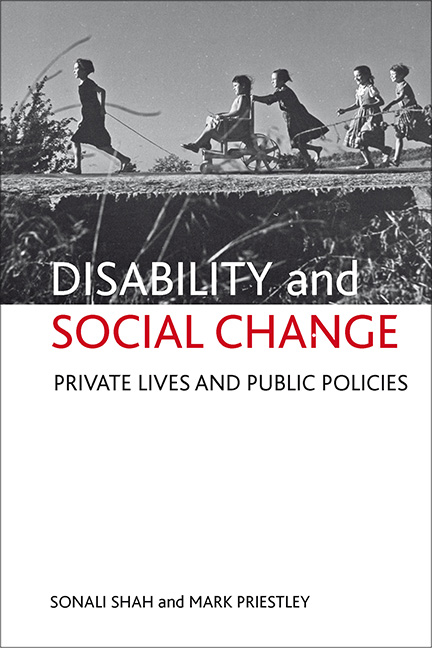eight - Conclusion
Published online by Cambridge University Press: 01 September 2022
Summary
The preceding seven chapters have covered a wide-ranging exploration of the ways in which changes in public policies and institutions, coupled with changes in civil society, have impacted on the private lives of young people with physical impairments since the 1940s. This exploration was intimately informed by a critical engagement with biographical narratives generated from life history interviews with people from three generational cohorts, who experienced childhood and the transition to adulthood in different historical times. The method of analysis sought to engage with these narratives as a stimulus to pose questions about parallel developments in public policies and institutions. This final part of the book reviews these developments, drawing on key findings from the substantive chapters, and returns to the questions outlined at the beginning. It also reflects on the utility of using biographical evidence to tell histories of disability.
Reflections on biography
Activist and academic discourse within the social model paradigm has emphasised the commonality of disability as oppression and institutionalised discrimination. This is fundamental to a social understanding of disability in contemporary societies and to the mobilisation of a cohesive social movement. Disability, like patriarchy and racism, is also something that affects people in their private lives, both materially and psycho-emotionally. The personal experience so evident in biographical accounts conveys the diversity of individual lives. It is not surprising then that the ‘biographical turn’ in social science (see Rustin, 2000) has drawn much inspiration from post-structural critiques of grand theory but, as feminist thought has long reminded us, the ‘personal’ is also ‘political’ and the boundaries between public and private are often fractured or blurred. Disability studies, like feminist studies, have shown repeatedly how public policies and institutions arising from unequal social relations can reach deep into people's private lives and relationships. The lives of young disabled people have been particularly marked by this kind of public reach – making intimate lives very public and constraining private life decisions.
Stories demonstrate the very real ways in which policies (for example, policies for the provision of public health and social care, education, housing or transport) impact on everyday life and close personal relationships.
- Type
- Chapter
- Information
- Disability and Social ChangePrivate Lives and Public Policies, pp. 175 - 184Publisher: Bristol University PressPrint publication year: 2011



